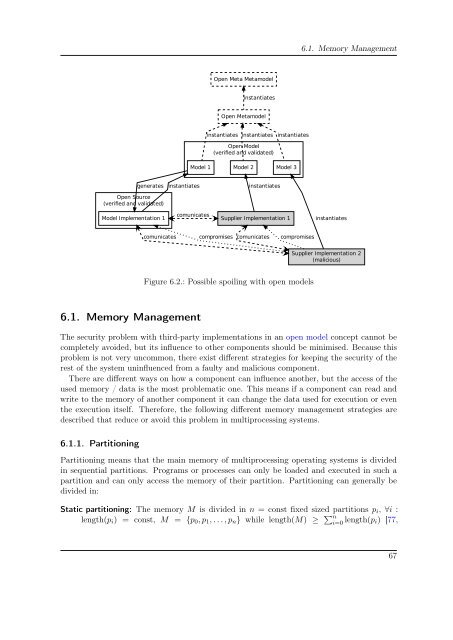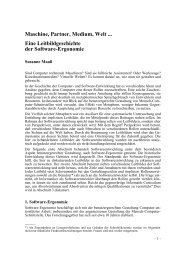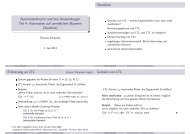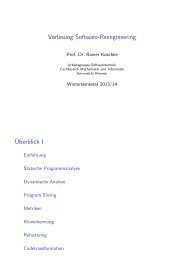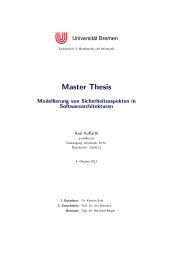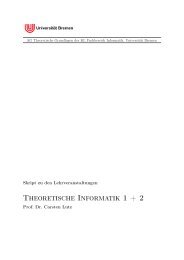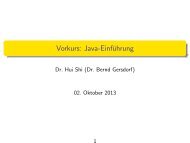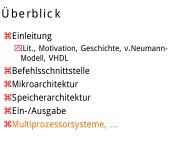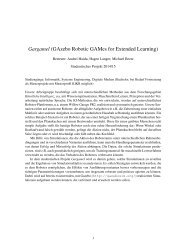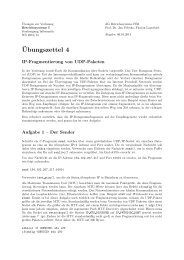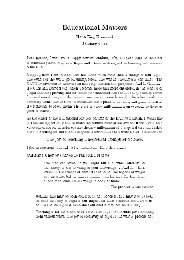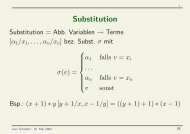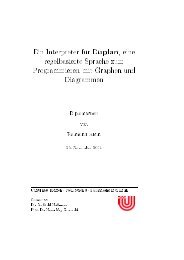- Page 1:
Open Source Software for Train Cont
- Page 4 and 5:
Datum des Promotionskolloquiums: 21
- Page 7 and 8:
Acknowledgments I would like to tha
- Page 9:
Abstract This document describes th
- Page 12 and 13:
Contents 3.3.3. Rascal . . . . . .
- Page 14 and 15:
Contents 8.4. Behavioural Design .
- Page 16 and 17:
Contents D.3. Domain Framework Mode
- Page 18 and 19:
List of Figures 6.4. Simple CORBA u
- Page 20 and 21:
List of Figures 10.27. General read
- Page 22 and 23:
Chapter 1. Introduction Railway Con
- Page 24 and 25:
Chapter 1. Introduction MontiCore M
- Page 26 and 27:
Chapter 1. Introduction ERTMS Forma
- Page 29:
Part I. Background 9
- Page 32 and 33:
Chapter 2. Concepts for Safe Railwa
- Page 34 and 35:
Chapter 2. Concepts for Safe Railwa
- Page 36 and 37: Chapter 2. Concepts for Safe Railwa
- Page 38 and 39: Chapter 2. Concepts for Safe Railwa
- Page 40 and 41: Chapter 2. Concepts for Safe Railwa
- Page 42 and 43: Chapter 3. Domain-Specific Modellin
- Page 44 and 45: Chapter 3. Domain-Specific Modellin
- Page 46 and 47: Chapter 3. Domain-Specific Modellin
- Page 48 and 49: Chapter 3. Domain-Specific Modellin
- Page 50 and 51: Chapter 3. Domain-Specific Modellin
- Page 52 and 53: Chapter 3. Domain-Specific Modellin
- Page 54 and 55: Chapter 3. Domain-Specific Modellin
- Page 56 and 57: Chapter 3. Domain-Specific Modellin
- Page 59 and 60: 4The GOPPRR Meta Meta Model - An Ex
- Page 61 and 62: 4.1. Concrete Syntax Description Fo
- Page 63 and 64: 4.2. GOPPRR C++ Abstract Syntax Mod
- Page 65 and 66: 4.2. GOPPRR C++ Abstract Syntax Mod
- Page 67 and 68: 4.5. The Object Constraint Language
- Page 69 and 70: 4.5. The Object Constraint Language
- Page 71 and 72: 4.6. Tool Chain where artefacts are
- Page 73 and 74: 4.7. Conclusion External Artefacts
- Page 75: Part II. Dependability 55
- Page 78 and 79: Chapter 5. Verification and Validat
- Page 80 and 81: Chapter 5. Verification and Validat
- Page 82 and 83: Chapter 5. Verification and Validat
- Page 85: 6Security in Open Source Software A
- Page 89 and 90: 6.2. Hardware Virtualisation a fixe
- Page 91 and 92: 6.2. Hardware Virtualisation in a v
- Page 93 and 94: 6.2. Hardware Virtualisation Again,
- Page 95 and 96: 6.2. Hardware Virtualisation the fa
- Page 97: Part III. openETCS Case Study 77
- Page 100 and 101: Chapter 7. openETCS Meta Model far
- Page 102 and 103: Chapter 7. openETCS Meta Model gEVC
- Page 104 and 105: Chapter 7. openETCS Meta Model gEVC
- Page 106 and 107: Chapter 7. openETCS Meta Model gMai
- Page 108 and 109: Chapter 7. openETCS Meta Model Outp
- Page 110 and 111: Chapter 7. openETCS Meta Model thei
- Page 112 and 113: Chapter 7. openETCS Meta Model gSub
- Page 114 and 115: Chapter 7. openETCS Meta Model The
- Page 116 and 117: Chapter 7. openETCS Meta Model can
- Page 118 and 119: Chapter 7. openETCS Meta Model The
- Page 120 and 121: Chapter 7. openETCS Meta Model List
- Page 122 and 123: Chapter 7. openETCS Meta Model 5 s
- Page 124 and 125: Chapter 7. openETCS Meta Model 7.5.
- Page 126 and 127: Chapter 7. openETCS Meta Model 12 )
- Page 128 and 129: Chapter 7. openETCS Meta Model 7.5.
- Page 130 and 131: Chapter 7. openETCS Meta Model Thus
- Page 132 and 133: Chapter 7. openETCS Meta Model In t
- Page 134 and 135: Chapter 7. openETCS Meta Model Valu
- Page 136 and 137:
Chapter 7. openETCS Meta Model This
- Page 138 and 139:
Chapter 7. openETCS Meta Model and
- Page 140 and 141:
Chapter 7. openETCS Meta Model 7.8.
- Page 142 and 143:
Chapter 8. openETCS Domain Framewor
- Page 144 and 145:
Chapter 8. openETCS Domain Framewor
- Page 146 and 147:
Chapter 8. openETCS Domain Framewor
- Page 148 and 149:
Chapter 8. openETCS Domain Framewor
- Page 150 and 151:
Chapter 8. openETCS Domain Framewor
- Page 152 and 153:
Chapter 8. openETCS Domain Framewor
- Page 154 and 155:
Chapter 8. openETCS Domain Framewor
- Page 156 and 157:
Chapter 8. openETCS Domain Framewor
- Page 158 and 159:
Chapter 8. openETCS Domain Framewor
- Page 160 and 161:
Chapter 8. openETCS Domain Framewor
- Page 162 and 163:
Chapter 8. openETCS Domain Framewor
- Page 164 and 165:
Chapter 8. openETCS Domain Framewor
- Page 166 and 167:
Chapter 8. openETCS Domain Framewor
- Page 168 and 169:
Chapter 8. openETCS Domain Framewor
- Page 170 and 171:
Chapter 8. openETCS Domain Framewor
- Page 172 and 173:
Chapter 8. openETCS Domain Framewor
- Page 174 and 175:
Chapter 8. openETCS Domain Framewor
- Page 176 and 177:
Chapter 8. openETCS Domain Framewor
- Page 178 and 179:
Chapter 8. openETCS Domain Framewor
- Page 180 and 181:
Chapter 9. openETCS Generator Appli
- Page 182 and 183:
Chapter 9. openETCS Generator Appli
- Page 184 and 185:
Chapter 9. openETCS Generator Appli
- Page 186 and 187:
Chapter 9. openETCS Generator Appli
- Page 188 and 189:
Chapter 9. openETCS Generator Appli
- Page 190 and 191:
Chapter 9. openETCS Generator Appli
- Page 192 and 193:
Chapter 9. openETCS Generator Appli
- Page 194 and 195:
Chapter 9. openETCS Generator Appli
- Page 196 and 197:
Chapter 9. openETCS Generator Appli
- Page 198 and 199:
Chapter 9. openETCS Generator Appli
- Page 200 and 201:
Chapter 10. openETCS Model No Power
- Page 202 and 203:
Chapter 10. openETCS Model c4 bool
- Page 204 and 205:
Chapter 10. openETCS Model c1 c8 c1
- Page 206 and 207:
Chapter 10. openETCS Model Applicat
- Page 208 and 209:
Chapter 10. openETCS Model c1 c25 c
- Page 210 and 211:
Chapter 10. openETCS Model Initiali
- Page 212 and 213:
Chapter 10. openETCS Model Reverse
- Page 214 and 215:
Chapter 10. openETCS Model 0 (CONST
- Page 216 and 217:
Chapter 10. openETCS Model Current
- Page 218 and 219:
Chapter 10. openETCS Model c7 bool
- Page 220 and 221:
Chapter 10. openETCS Model Current
- Page 222 and 223:
Chapter 10. openETCS Model The purp
- Page 224 and 225:
Chapter 10. openETCS Model 10.3.3.
- Page 226 and 227:
Chapter 10. openETCS Model be expla
- Page 228 and 229:
Chapter 10. openETCS Model 10.4.4.
- Page 231 and 232:
11 openETCS Simulation Generally, a
- Page 233 and 234:
11.2. Platform Specific Model for t
- Page 235 and 236:
11.2. Platform Specific Model for t
- Page 237 and 238:
11.2. Platform Specific Model for t
- Page 239 and 240:
11.3. Simulation Model Figure 11.6.
- Page 241 and 242:
11.3. Simulation Model 11.3.2. CDMI
- Page 243 and 244:
11.3. Simulation Model sets the Boo
- Page 245 and 246:
11.3. Simulation Model Entering_Dri
- Page 247 and 248:
11.3. Simulation Model The states o
- Page 249 and 250:
11.3. Simulation Model Figure 11.13
- Page 251 and 252:
11.3. Simulation Model Figure 11.14
- Page 253 and 254:
11.3. Simulation Model Figure 11.15
- Page 255:
11.6. Conclusion about warnings, fa
- Page 258 and 259:
Chapter 12. Conclusion and Outlook
- Page 261:
Part IV. Appendix 241
- Page 264 and 265:
Appendix A. GOPPRR to MOF Transform
- Page 266 and 267:
Appendix B. openETCS Meta Model Con
- Page 268 and 269:
Appendix B. openETCS Meta Model Con
- Page 270 and 271:
Appendix B. openETCS Meta Model Con
- Page 273 and 274:
DopenETCS Domain Framework D.1. Dom
- Page 275 and 276:
D.2. Domain Framework Source Code 8
- Page 277:
D.3. Domain Framework Model 32 m_pT
- Page 280 and 281:
Appendix E. openETCS Generator 39 <
- Page 282 and 283:
Appendix E. openETCS Generator 200
- Page 284 and 285:
Appendix E. openETCS Generator 46 4
- Page 287 and 288:
FMetaEdit+ Generators F.1. GOPPRR X
- Page 289:
GopenETCS Unit Testing G.1. Unit Te
- Page 292 and 293:
Appendix H. openETCS Simulation 14
- Page 294 and 295:
Appendix H. openETCS Simulation 25
- Page 296 and 297:
Appendix H. openETCS Simulation 229
- Page 299 and 300:
Glossary ANTLR ANother Tool for Lan
- Page 301 and 302:
Glossary EVC An European Vital Comp
- Page 303 and 304:
Glossary OEM An original equipment
- Page 305:
Glossary XML The Extensible Markup
- Page 308 and 309:
Bibliography [12] “EN 50128 - Rai
- Page 310 and 311:
Bibliography [39] ——, ““Ope
- Page 312 and 313:
Bibliography [69] T. J. Parr and R.
- Page 315 and 316:
Index Artefact, 51 Automatic train
- Page 317 and 318:
Index Linux, 149 Memory management,


